Pediatric Surgery Division
About
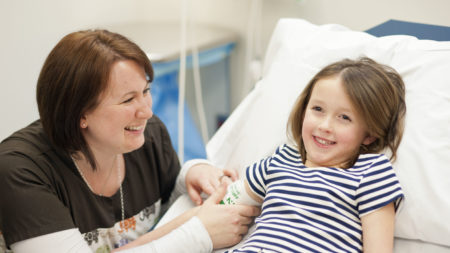
The Pediatric Surgery Division, the Department of Surgery, UVA Children’s, and UVA Health provides comprehensive diagnostic and therapeutic care of surgical diseases in children ranging from premature infants to adolescents. Each physician in the division has completed a full residency in General Surgery, an additional two years of training in Pediatric Surgery and is certified in Pediatric Surgery and General Surgery by the American Board of Surgery.
In conjunction with the surgeons, our nurse clinicians provide comprehensive attention to patient care questions and help schedule operative cases and clinic appointments.
When a child’s medical care requires more than rest, our division is equipped with the training and equipment necessary to provide the best of care.
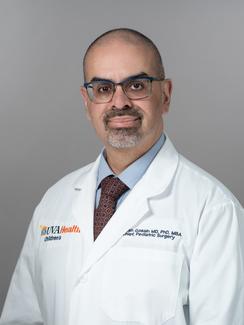
Ankush Gosain, MD, PhD, MBA; Chief, Division of Pediatric Surgery; Surgeon-in-Chief, UVA Children’s Hospital
Welcome! The Division of Pediatric Surgery is a group of surgeons, advanced practice providers, and nurses, all of whom are dedicated to providing the most comprehensive and high-quality surgical care possible to children and their families. Our group has deep expertise in minimally invasive surgery approaches and the entire spectrum of surgical childhood conditions, ranging from those that occur commonly such as hernias and appendicitis, to more rare conditions that require complex, multidisciplinary decision-making and care. We care for children of all ages, from prenatal counseling for mothers carrying fetuses with surgical conditions to young adults. We work closely with our colleagues throughout UVA Health Children’s, in other surgical disciplines and in the Department of Pediatrics, to ensure a comprehensive, patient- and family-centered approach to care. Our vision is to lead the country by transforming patient care, research, education, and community engagement.
Ankush Gosain, MD, PhD, MBA, FACS, FAAP
Surgeon-in-Chief | UVA Health Children’s Hospital
Division Chief | Division of Pediatric Surgery
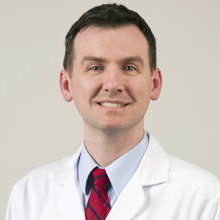
Jeffrey W. Gander, MD
Associate Professor
Read Dr. Gander’s Full Bio

Lily Cheng, MD
Assistant Professor
Read Dr. Cheng’s Full Bio

Ankush Gosain, MD, PhD, MBA
Chief of Pediatric Surgery, Professor
Read Dr. Gosain’s Full Bio
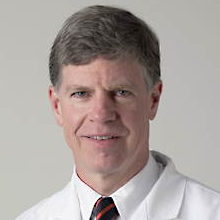
Eugene D. McGahren III, MD
Professor
Read Dr. McGahren’s Full Bio
Clinical Programs
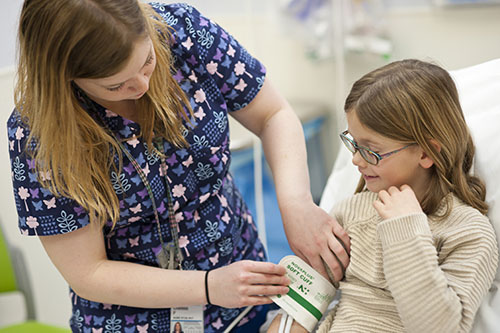 The Division of Pediatric Surgery provides all of the surgical care expected of a major children’s hospital. This includes treating conditions involving premature infants and neonates, thoracic cavity and chest wall, abdomen, head and neck, soft tissue, hernias, tumors and malignancies. The division also provides support to children being treated by other surgical disciplines such as cardiac, neurosurgery and transplant. The division has provided ECMO continuously for almost 30 years. In collaboration with our obstetric and NICU colleagues, we provide prenatal counseling to mothers carrying fetuses with surgical conditions in anticipation of these deliveries occurring in our own center. Moreover, as part of being a children’s hospital within a hospital, we can also take advantage of all the comprehensive facility and collaborative capabilities in the UVA Health System.
The Division of Pediatric Surgery provides all of the surgical care expected of a major children’s hospital. This includes treating conditions involving premature infants and neonates, thoracic cavity and chest wall, abdomen, head and neck, soft tissue, hernias, tumors and malignancies. The division also provides support to children being treated by other surgical disciplines such as cardiac, neurosurgery and transplant. The division has provided ECMO continuously for almost 30 years. In collaboration with our obstetric and NICU colleagues, we provide prenatal counseling to mothers carrying fetuses with surgical conditions in anticipation of these deliveries occurring in our own center. Moreover, as part of being a children’s hospital within a hospital, we can also take advantage of all the comprehensive facility and collaborative capabilities in the UVA Health System.
We provide surgical care for all neonates and infants, premature or full term. This covers congenital and acquired conditions such as gastroschisis, omphalocele, esophageal atresia and trachea-esophageal fistula, congenital diaphragmatic hernia, necrotizing enterocolitis, bowel atresia and many others. A level IV NICU supports the care of the most challenging infants.
We provide surgical care for congenital lesions such as lung sequestration, CPAM, bronchogenic and esophageal cysts and esophageal atresia/TEF.
Pectus excavatum is managed by minimally invasive technique, such as the Nuss Procedure, or open technique as appropriate. Pectus carinatum can be managed by innovative bracing strategies or surgical intervention as appropriate.
We manage a variety of surgical conditions of the abdomen and groin including congenital bowel atresias, intussusception, hernias, hepatobiliary conditions (biliary atresia, choledochjal cysts, gallstones, etc.), pyloric stenosis, gastro-esophageal reflux, feeding access, inflammatory bowel disease, ovarian conditions (tumors, cysts, torsion, etc.) and conditions of the spleen and pancreas.
We perform surgical management of airway and esophageal foreign body ingestion, congenital masses and cysts, branchial cleft anomalies, thyroglossal duct cysts and thyroid conditions.
We cover many conditions requiring surgery such as neuroblastoma, Wilm’s tumor, sarcoma, embryonal tumors, and tumors of the liver, ovaries and testicles. Supportive care, such as vascular access and biopsies, is provided for children with non-surgical primary oncologic conditions.
We can recognize many congenital surgical conditions prenatally. Parents can receive comprehensive prenatal counseling through Pediatric Surgery in conjunction with Obstetric and Neonatology colleagues. The UVA Women’s Center can appropriately plan delivery with care of the baby immediately available in the NICU of the UVA Children’s Hospital.
UVA Children’s Hospital is able to provide the highest level of comprehensive care to the children of our extended region by providing ECMO and supportive care to infants and children requiring cardiac, neurosurgical and transplant surgical support.
Education and Training
The Pediatric Surgery Division plays a supportive role in educating residents, medical students and those aspiring to enter the healthcare field. Our clinical work exposes students to the vast array of surgical techniques and practices employed while caring for children of all ages.
Pediatric Surgery is dedicated to educating general surgery residents and residents of other disciplines who regularly care for children. Surgery residents rotate as Chief Resident during their fourth year. Some have chosen to pursue a career in Pediatric Surgery and have been supported in securing fellowship training.
Residents from the general surgery, pediatrics, and emergency department residency programs rotate on a monthly basis as interns, becoming more familiar with the evaluation and management of surgical conditions in children and fostering collaborative relationships amongst the disciplines.
Third and fourth year medical students rotate on the Pediatric Surgery Service on a regular basis. The service has a top reputation among students for its educational efforts and value. Dr. Gander is the Associate Director for the General Surgery medical student clerkship, and Dr. McGahren is past Director of the clerkship.
The pediatric surgery service is dedicated to hosting shadow students when appropriate. Students from nursing, post-baccalaureate, undergraduate and high school programs have participated.
Innovation
Our focus on innovation opens new ways to focus on our primary goal: Giving excellent patient care. Using minimally invasive surgery techniques, employing new management strategies for various conditions and promoting ERAS principles are a few ways in which we do this.
The Pediatric Surgery Service employs a wide variety of minimally invasive techniques to treat a variety of intra-thoracic, chest wall and abdominal conditions in infants and older children. These include a variety of thoracoscopic and laparoscopic techniques for pectus excavatum, pectus carinatum, lung lesions, various intra-abdominal conditions, hernias and many others.
We use innovative management strategies such as sutureless closure of gastroschisis, permissive hypercapnia ventilator management for congenital diaphragmatic hernia and non-surgical treatment of lymphangioma.
 The Division of Pediatric Surgery has been one of the national leaders in promoting principles of ERAS, such as minimal use of opioids, in surgical care of infants and children.
The Division of Pediatric Surgery has been one of the national leaders in promoting principles of ERAS, such as minimal use of opioids, in surgical care of infants and children.
Pediatric Research
Pediatric Surgery Research
View Our ResearchAll members of the division participate in series and case reports to share insights into the care of a variety of Pediatric Surgery conditions.
Jeffrey Gander, MD has been instrumental in introducing or advancing innovative care strategies for our Pediatric Surgery practice including sutureless closure for gastroschisis, applying ERAS principles to reduce the use of opiates in infant and children after operative procedures and advancing the application of minimally invasive principles for a wide variety of conditions. He has published on these and other topics. He also leads the division’s participation in a multi-center prospective randomized trial to determine the appropriate timing of surgery for premature infants with hernias.
Lily Cheng, MD, heads a basic/translational research laboratory which is focused on improving outcomes for children with congenital colorectal diseases and functional gastrointestinal disorders. She is the principal investigator on a National Institutes of Health research grant to investigate the role of biomechanical forces on the enteric nervous system in Hirschsprung disease. She is also supported by the American Pediatric Surgical Association and the American College of Surgeons.
Pediatric Surgery Research
View Our ResearchCharitable Giving
Support Pediatric Surgery
Give TodayYour gracious support will help us reach our goal: To understand the roots of childhood diseases so that we can develop more effective, personalized, safer therapies and bring them to children!
Check:
Your check should be made payable to UVA Children’s Hospital.
For mailed gifts, the address is:
UVA Children’s Hospital
University of Virginia Health Foundation
PO Box 800773
Charlottesville, VA 22908-0773
(434) 924-8432
Credit Card:
Click on the button above to donate online. You can also contact the University of Virginia Health Foundation directly (434-924-8432) to donate by phone.
